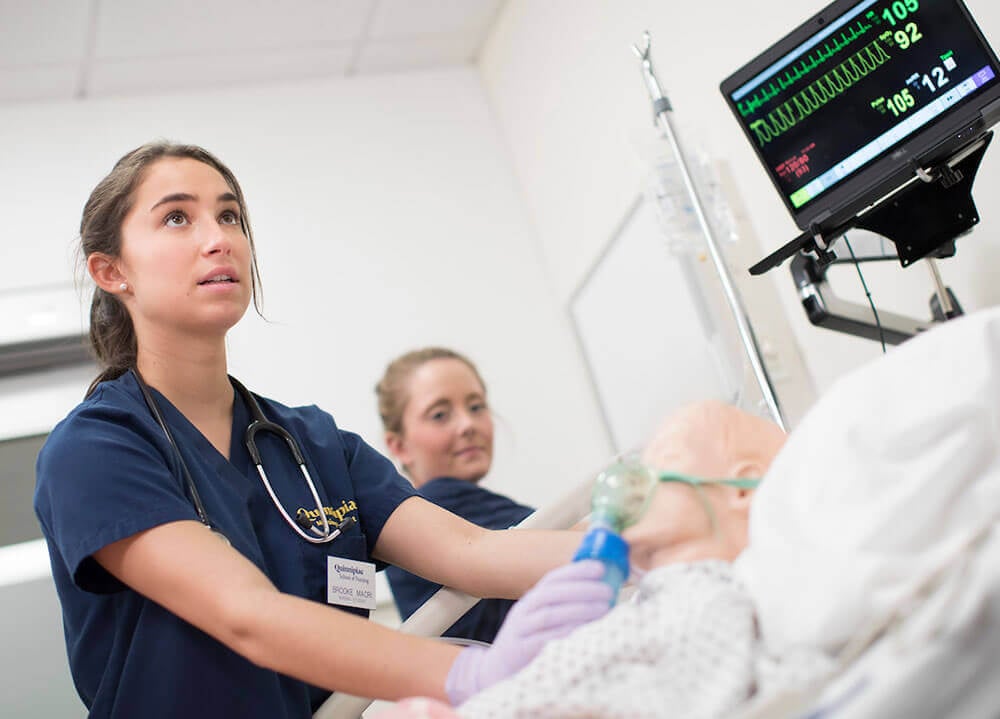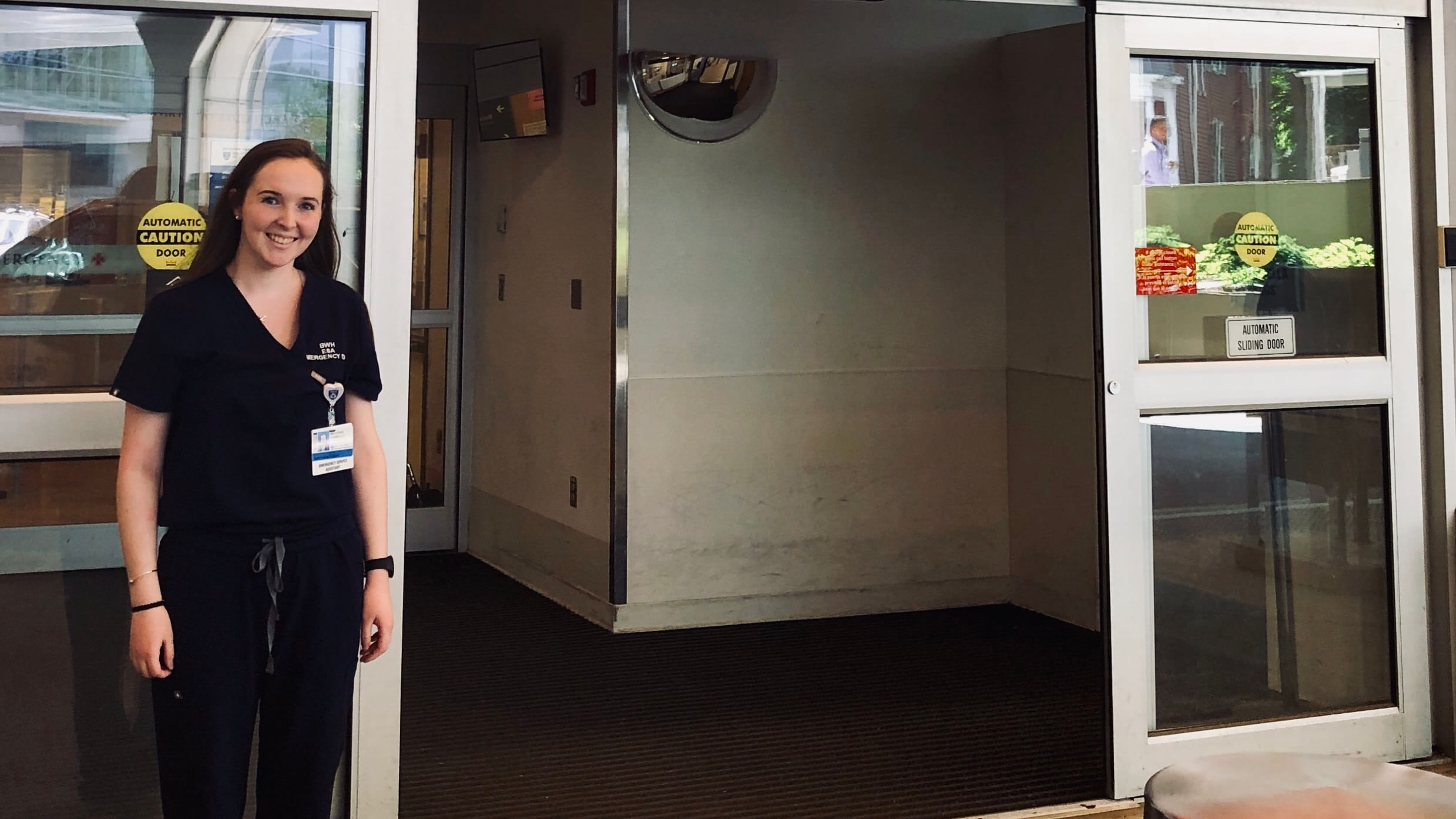
From helping bring new babies into the world to reviving patients in the ER, nurses work in every corner of the health care profession, caring for people across their lifespan.


From helping bring new babies into the world to reviving patients in the ER, nurses work in every corner of the health care profession, caring for people across their lifespan.

Nurses assess health problems, develop plans for patient care and educate patients on disease prevention. With an expected shortfall of 1 million nurses by 2020 and nurses absorbing more responsibilities, career opportunities have never been greater. Nurses are in demand not only in acute care and primary care settings, but also in new and growing fields, such as nursing informatics, which involves using patient data to improve the quality of care.
You’ll experience diverse health care settings working with over 300 clinical affiliates in hospitals, clinics, schools, private practices and home health agencies. Through our study abroad trips designed for graduate and undergraduate students, you’ll work with other health disciplines to increase your awareness of global health issues.
Our program prepares you to be an integral member of the interprofessional health care team and a transformational leader in the field. You’ll graduate with the knowledge, skills and attitude to start your career, or to advance your education with a master’s or doctor of nursing practice degree.
Our undergraduate nursing program is ranked #9 out of 518 schools nationwide by College Factual. This puts our program in the top 5% of all nursing programs in the United States. Based upon PayScale survey data, a student who graduates from Quinnipiac with a bachelor’s degree in nursing will make an average early-career wage of $67,000 and an average mid-career wage of $76,000. This is above a national average of $53,000 (early career) and $70,000 (mid-career) for all nursing graduates.
The research team at Nursing Schools Almanac ranked Quinnipiac #8 out of 60 nursing schools in New England. They evaluated nursing schools in the region on 3 dimensions: the institution’s academic prestige and perceived value; the breadth and depth of nursing programs offered; and student success, particularly on the National Council Licensure Examination (NCLEX) . This is compared to schools in Connecticut, Maine, Massachusetts, New Hampshire, Rhode Island and Vermont.

Meghan Coakley ’20
Meghan Coakley ’20 saw many trauma cases at Brigham and Women’s Hospital in Boston during the summer of 2019. What stood out the most for her wasn’t the trauma wounds, but the way her team sprung into action whenever a life hung in the balance.
“Collaborating with those doctors, PAs and nurses to save lives was powerful for me,” Coakley said.
She worked three 12-hour shifts a week as an emergency services assistant at Brigham and Women’s. Each day, she prepared trauma patients for examination, treatment and transport alongside a multidisciplinary team of caregivers.
While her days and nights were exhausting, they were anything but dull.
“You get such variety in the emergency department,” Coakley said. “Every day brought something new, and I got to work with a lot of great nurses.”
A Massachusetts native, Coakley credits Quinnipiac with helping her get professional experience in one of the city’s most prestigious hospitals.
Something that set Coakley apart in the eyes of her recruiter was Quinnipiac’s endorsement by the Holistic Nurses Association.
“It means that we look at the patient as a whole individual, not just a diagnosis,” she said. “It definitely put me ahead.”
Proving her value, work ethic and composure in one of Boston’s busiest emergency departments gave Coakley new levels of confidence to finish her senior year — and take the NCLEX exam.
“I like to think I was born to be a nurse,” she said. “I can’t imagine doing anything else.”
The Nursing Living-Learning Community provides first-year students with a daily support system, as well as the opportunity to form meaningful relationships with other nursing students and faculty.
Living in this unique community enables you to participate in regularly planned activities connected to health care, meet with faculty informally to hear stories about their professional journey and engage in volunteer activities with nursing students.
Upon completion of the program, the BSN graduate will demonstrate the following competencies:
The Bachelor of Science in Nursing program, the Master of Science in Nursing program and the Doctor of Nursing Practice program at Quinnipiac University are accredited by the Commission on Collegiate Nursing Education, 655 K Street, NW, Suite 750, Washington, D.C. 20001, 202-887-6791.
Many of the nursing programs within Quinnipiac University’s School of Nursing also are endorsed by the American Holistic Nurses Credentialing Corporation. Graduates of these programs are eligible to take the appropriate national exam to become board-certified holistic nurses at the basic or advanced level of nursing:
Bachelor’s degree (HNB-BC)
Nurse practitioner graduate degree (APHN-BC or AHN-BC)
Our undergraduate admissions counselors are here to answer any questions you may have and help you navigate the application process.